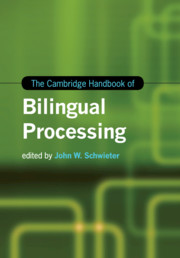Crossref Citations
This Book has been
cited by the following publications. This list is generated based on data provided by Crossref.
2016.
References.
Language Learning,
Vol. 66,
Issue. S1,
p.
313.
Parma, Alan
2017.
Cross-Linguistic Transfer of Object Clitic Structure: A Case of L3 Brazilian Portuguese.
Languages,
Vol. 2,
Issue. 3,
p.
14.
Schwieter, John W.
and
Ferreira, Aline
2017.
The Handbook of Translation and Cognition.
p.
144.
Green, David W.
2018.
Language Control and Code-switching.
Languages,
Vol. 3,
Issue. 2,
p.
8.
Beatty-Martínez, Anne L.
Valdés Kroff, Jorge R.
and
Dussias, Paola E.
2018.
From the Field to the Lab: A Converging Methods Approach to the Study of Codeswitching.
Languages,
Vol. 3,
Issue. 2,
p.
19.
Sridhar, S. N.
and
Sridhar, Kamal K.
2018.
Mixing, multilingualism, and intelligibility.
World Englishes,
Vol. 37,
Issue. 3,
p.
511.
Pot, Anna
Keijzer, Merel
and
De Bot, Kees
2018.
Intensity of Multilingual Language Use Predicts Cognitive Performance in Some Multilingual Older Adults.
Brain Sciences,
Vol. 8,
Issue. 5,
p.
92.
Conklin, Kathy
2019.
The Routledge Handbook of Vocabulary Studies.
p.
174.
Boumeester, Marlijne
Michel, Marije C.
and
Fyndanis, Valantis
2019.
Sequential Multilingualism and Cognitive Abilities: Preliminary Data on the Contribution of Language Proficiency and Use in Different Modalities.
Behavioral Sciences,
Vol. 9,
Issue. 9,
p.
92.
Solís-Barroso, Cecilia
and
Stefanich, Sara
2019.
Measuring Language Dominance in Early Spanish/English Bilinguals.
Languages,
Vol. 4,
Issue. 3,
p.
62.
ELLIS, NICK C.
2019.
Essentials of a Theory of Language Cognition.
The Modern Language Journal,
Vol. 103,
Issue. S1,
p.
39.
Wu, Ruilin
Struys, Esli
and
Lochtman, Katja
2019.
Relationship between Language Dominance and Stimulus-Stimulus or Stimulus-Response Inhibition in Uyghur-Chinese Bilinguals with an Investigation of Speed-Accuracy Trade-Offs.
Behavioral Sciences,
Vol. 9,
Issue. 4,
p.
41.
2019.
The internal context of bilingual processing.
Vol. 8,
Issue. ,
Daly, Damien
and
Dounavi, Katerina
2020.
A Comparison of Tact Training and Bidirectional Intraverbal Training in Teaching a Foreign Language: A Refined Replication.
The Psychological Record,
Vol. 70,
Issue. 2,
p.
243.
Dicataldo, Raffaele
and
Roch, Maja
2020.
Are the Effects of Variation in Quantity of Daily Bilingual Exposure and Socioeconomic Status on Language and Cognitive Abilities Independent in Preschool Children?.
International Journal of Environmental Research and Public Health,
Vol. 17,
Issue. 12,
p.
4570.
Caws, Catherine
2020.
Alessandro G. Benati, and Tanja Angelovska. 2016. Second language acquisition: A theoretical introduction to real-world applications. London: Bloomsbury. Pp. 200. $US 39.95 (softcover)..
Canadian Journal of Linguistics/Revue canadienne de linguistique,
Vol. 65,
Issue. 4,
p.
593.
Cuccurullo, Daniela
and
Cinganotto, Letizia
2020.
Handbook of Research on Bilingual and Intercultural Education.
p.
125.
De Fina, Anna
and
Georgakopoulou, Alexandra
2020.
The Cambridge Handbook of Discourse Studies.
De Groot, Annette M. B.
2021.
The Encyclopedia of Applied Linguistics.
p.
1.
Ahmadian, Mohammad Javad
and
Long, Michael H.
2021.
The Cambridge Handbook of Task-Based Language Teaching.



